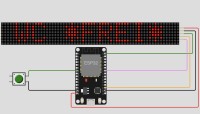WOKWI + ANNEX32: WC occupied/vacant display with MAX7219

A WOKWI Project Example for a WC occupied/vacant display built with an ESP32, two MAX7219 modules, and programmed with the ANNEX32 BASIC Interpreter.
As an example project for a young German electronics and programming beginner who started to investigate the microcontroller world and use the ESP32-BASIC Interpreter ANNEX32 , I "built" a vacant/occupied display of a restaurant toilet.
I used an ESP32, two MAX7219 4*8*8 LED matrix modules and a simple microswitch to create a text banner that always clearly indicates in the guest room whether the toilet is currently occupied or not.
For the poor beginner who was not rich in peripheral components, breadboards etc, however, the start should remain as low-theshold and absolutely hardware-independent as possible, at least in the planning, development and experimentation phase.
Quick motivating success but no short circuits or even smoke were the plan. So I created the example circuit purely virtually with the browser-based hardware and software simulator WOKWI and tried to keep the Annex32 BASIC code easy to understand and explained it more detailed.
--> THE WOKWI-Annex32-EXAMPLE GERMAN version
--> THE WOKWI-Annex32-EXAMPLE ENGLISH version
Don't forget to press the play button ">" in the hardware window to start the simulation. Then watch the MAX7219 display and press the virtual switch to change the text of the banner. This will work well even in Chrome or Safari on a tablet or smartphone.
My project is certainly not a masterpiece of programming - but perhaps a good example for beginners. It reflects the very versatile use of WOKWI to simulate IOT projects in the browser. This also results in a powerful combination with the performance and ease of learning of BASIC. The programmer of ANNEX32, together with the author of WOKWI, has put a lot of successful effort into making even ANNEX32 available in WOKWI.
You can easily modify the example circuit and the BASIC code in WOKWI to create your own projects with ANNEX32 in your browser window. For example, the number of 7219 modules is quickly increased to 10 in the WOKWI file schematic.json. Similarly, the value of the corresponding variable in main.bas can simply be increased to the appropriate number of modules.
The ESP32 can be virtually wired with a large selection of actuators, sensors and display elements known and commonly used in the microcontroller world. Then modify or exchange the content of the file main.bas to meet your needs.
If you need a good help for the BASIC-syntax and the many options of the ANNEX32 BASIC, take a look at the online help file
When your project is ready for the real world ... the "real" ANNEX32 BASIC Interpreter can be found HERE.
Not only if you need some inspiration for your Annex32-BASIC projects the Annex32 forum may be a helpful source.
I used an ESP32, two MAX7219 4*8*8 LED matrix modules and a simple microswitch to create a text banner that always clearly indicates in the guest room whether the toilet is currently occupied or not.
For the poor beginner who was not rich in peripheral components, breadboards etc, however, the start should remain as low-theshold and absolutely hardware-independent as possible, at least in the planning, development and experimentation phase.
Quick motivating success but no short circuits or even smoke were the plan. So I created the example circuit purely virtually with the browser-based hardware and software simulator WOKWI and tried to keep the Annex32 BASIC code easy to understand and explained it more detailed.
--> THE WOKWI-Annex32-EXAMPLE GERMAN version
--> THE WOKWI-Annex32-EXAMPLE ENGLISH version
Don't forget to press the play button ">" in the hardware window to start the simulation. Then watch the MAX7219 display and press the virtual switch to change the text of the banner. This will work well even in Chrome or Safari on a tablet or smartphone.
My project is certainly not a masterpiece of programming - but perhaps a good example for beginners. It reflects the very versatile use of WOKWI to simulate IOT projects in the browser. This also results in a powerful combination with the performance and ease of learning of BASIC. The programmer of ANNEX32, together with the author of WOKWI, has put a lot of successful effort into making even ANNEX32 available in WOKWI.
You can easily modify the example circuit and the BASIC code in WOKWI to create your own projects with ANNEX32 in your browser window. For example, the number of 7219 modules is quickly increased to 10 in the WOKWI file schematic.json. Similarly, the value of the corresponding variable in main.bas can simply be increased to the appropriate number of modules.
The ESP32 can be virtually wired with a large selection of actuators, sensors and display elements known and commonly used in the microcontroller world. Then modify or exchange the content of the file main.bas to meet your needs.
If you need a good help for the BASIC-syntax and the many options of the ANNEX32 BASIC, take a look at the online help file
When your project is ready for the real world ... the "real" ANNEX32 BASIC Interpreter can be found HERE.
Not only if you need some inspiration for your Annex32-BASIC projects the Annex32 forum may be a helpful source.



Diskussion (1 Kommentar)